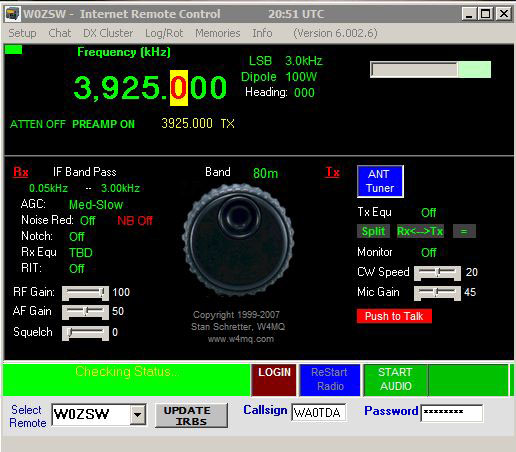Welcome to Handiham World.

What should you have to know to operate a club station?
Radio clubs usually do not have dedicated meeting space and extra room for a complete club station, but some do. Many clubs do have temporary "club stations" for the duration of club events or Field Day. What all of these club stations have in common is that they are shared resources that can be operated by many club members. For those amateur radio operators who cannot put up antennas at their homes, the club station is a great way to get on the HF bands or to have fun with VHF weak signal operation.But here's the problem: The typical home station will be configured by the owner to be exactly what that operator wants. It will have the brand of radio equipment and the accessories preferred by that person, and everything will be laid out in a customized fashion. The club station will be used by many different operators. It may have different equipment than what you are used to, and be configured differently. With all of these different operators, each with different station layouts at home, the club station presents a learning challenge!
Let's consider some basic skills that might be expected of each club station user. These might be part of a "check ride", similar to that given to a licensed pilot when being checked out in an airplane for the first time. Although a person may hold a pilot's license, it is by no means certain that the pilot knows everything about every airplane! The same is true about licensed amateur radio operators and radios. To begin this discussion, I have identified six basic knowledge areas, but you may be able to think of some others:
- License and identification: To operate an amateur radio station, you need a license, so a new user should expect to present his or her license along with some supporting identification (if requested) so that the club's station manager can determine if the licensee is current and what the operating privileges might be.
- Safety and convenience: Since the club station will be unfamiliar territory to the new user, it is important to go over basic safety topics. These include the emergency power shut off, the location of fire extinguishers and other emergency equipment such as an AED, the location of exits, a telephone, and restrooms, and how to call for emergency help.
- Ergonomics, accessories, and policies: This topic area covers your comfort and safety while operating the station. It will cover how to switch the lighting on and off, where writing materials, a frequency chart, and other commonly used desktop materials are found, seating adjustments, station layout, the ham shack computer (if there is one), and policies related to the use of the station. For example, a policy might include switching the equipment on and off in a certain sequence, no beverages on the operating desk, returning antennas and extendible towers to their nested positions at the end of a session, logging all contacts, using the club callsign, and so on.
- Radio orientation and operation: This will show the new operator what each piece of equipment does and how it operates. It will include all the basics, such as the power switch, tuning, modes, antenna switching and rotor control and use of various accessories such as amplifiers.
- Record-keeping: There may be a sign in/out sheet for users of the station. If logging of contacts is done, there may be a need to explain the procedure, whether it is by computer or in a paper logbook. There may also be a QSL policy and procedure. If a piece of equipment is not working or if a part is broken or missing there is usually a place to make note of it so that the club can remedy the problem.
- Securing at shutdown: After the operating session, the station must be shut down and secured. In some cases, this may include disconnecting the equipment from the power mains and antennas to prevent lightning damage. It is also considered good practice to leave the radio in a more or less "normal" mode of operation, so that the next user will not sit down to a radio that has been left in split frequency mode with the RF gain at zero and every button pressed and knob twisted! If desk accessories are used during the operating session, they should be returned to wherever they were stored so that the operating desk is clear of clutter. The lights should be turned off and the room should be secured in whatever way is described by club policy.
Email me at handiham@couragecenter.org with your questions & comments.
Patrick Tice, WA0TDA
Handiham Manager
Handiham remote base station report

W0EQO at Courage North is in service. W0ZSW is in service.